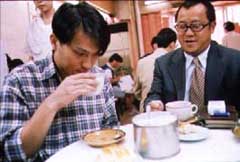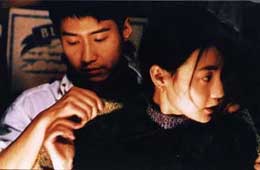 There are good things to report from the retrospective of Hong Kong Cinema recently held in Sydney (November 1998). Sure, the venture improves economic relations and awareness; sure there was an overflow of masturbation scenes and consumer trappings like pagers and quick fixes; sure there was a rich array of insular humour and attitude. But there was also the overall flavour of a culture framed by a background of opened borders and economic magnetism. And there were love stories, love stories.
There are good things to report from the retrospective of Hong Kong Cinema recently held in Sydney (November 1998). Sure, the venture improves economic relations and awareness; sure there was an overflow of masturbation scenes and consumer trappings like pagers and quick fixes; sure there was a rich array of insular humour and attitude. But there was also the overall flavour of a culture framed by a background of opened borders and economic magnetism. And there were love stories, love stories.
Below: Ann Hui's 'Summer Snow'I don't mean Remington Steels in Tai-Pan romances, I mean the view from the bottom up, like, from the street man, from the ordinary Joe with his dreams and broken family and long-time sweetheart, from the poverty and cubicle lifestyles. All the things that sound condescendingly jaded in spineless film reviews. But consider how many Chinese mainlanders must have flocked to the island in search of dollars, in the hope of improving their condition or getting that one lucky break. Hong Kong is a window on migration, the goal of people willing to uproot themselves en masse to make more money, lots more, irrespective of the shock, the suffering or the communist rhetoric. Something like the old-time Western frontier of America, or what the Statue of Liberty supposedly meant for all those arriving at Ellis Island, blessed by mobility and the pipe dream of streets paved with gold.
Below right: Maggie Cheung and Leon Lai in Peter Chan's 'Comrades, Almost A Love Story'
The affliction of the Twentieth Century is this universal need to follow the lure of easy money and greater product variety, to run from the suffering of poverty into the shadow suffering of capitalism; or the suffering of market-force order and illusions of convenience with acquired ambitions and exploitation. And through the window of Hong Kong, the outlook opens onto the emergent economic bloc of South-East Asia. Or rather, onto a mass of blockheaded reviewers looking for the new thing in cinema? With the inherited idea of rave reviews from QT, super fast ballets of gunfire in slow-motion magic, Hong Kong has come to mean Action Cinema to many hacks. But in terms of background conditions, there is so much in common here with Australia. There's more to migration than what enters our quirky telefilms, besides the cliche of cultures clashing, where daughters grow up quickly and want to go out with goons in cars, Daddy is conservative and Momma wants what's best for everyone in these trying times, and a quick resolution sends us back to our happy homes. Seen through Hong Kong, migration seems the background condition of the century, a universal suffering and hunger for (upward) mobility; and for the West, a final message of lifestyle=wealth. Let's face it, our universal dream here in Australia, like in any other economy, is to get rich, move up the ladder of ambition, and retire to the life of leasure or domestic imbecility (whilst building a house, renovating, and participating in the Napisan challenge). Wealth and lifestyle is our dictum. And if not found here, then wherever the gold is kept.
Below: Chiingmy Yau in Stanley Kwan's 'Hold You Tight'
There is no definition of Australia's true nature or identity that cannot be dissimilar from those of greater South East Asia, only in Australia the insular nature is more exaggerated. Sure, national identity is one of the vague themes argued at the level of representative politics, but this theme is one expressed effectively in cinema or in our underfunded excuse for an industry, through occasional films like The Boys. After the raves and superlatives, we often lose sight of the active coding of identity that goes on in the cinema, and we need to import another city's films to remember that. Take a scene from Made in Hong Kong by Fruit Chan: a girl stands on a high ledge with planes going over, the streets below, a large neon cross opposite, all shot in blue filter. A suicide: a narrative link to despair, communication and relations as unravelled by the film, and also the personal writing of identity and loss through love. Now there are no global allusions here to youth angst and frustration given a nationalist twist, and I'm not going to read these into the scene, but in an oblique way this summed up the effect of that window of Hong Kong. It is the past, the cinematic, the economic and the codes of reality all rolled into one, a perspective and a means to view the self and the world again. And there has been no film focusing through Sydney for instance that could generate this strength of perspective or defuse our equally cutthroat capitalism. Maybe a part of our national lifestyle is an aversion to cinematic mirrors. Or a blatant, comforting need for superla-critics who cannot perceive or understand the society they live in. And so we view Hong Kong and think about where we are. Or we nationalise and and universalise till the politics shine through.
rino breebaart
comments? email the author
 Above: Sunny Chan and Eric Tsang in Stanley Kwan's 'Hold You Tight' |  Above: Maggie and Leon in Peter Chan's 'Comrades, Almost A Love Story' |
Read our coverage of the 1999 Hongkong Film Festival
Do you know who Wong Kar-Wai is? We do.
What's the difference between Taiwanese and Cantonese cinema? Find out in our essay on Tsai Ming Liang.